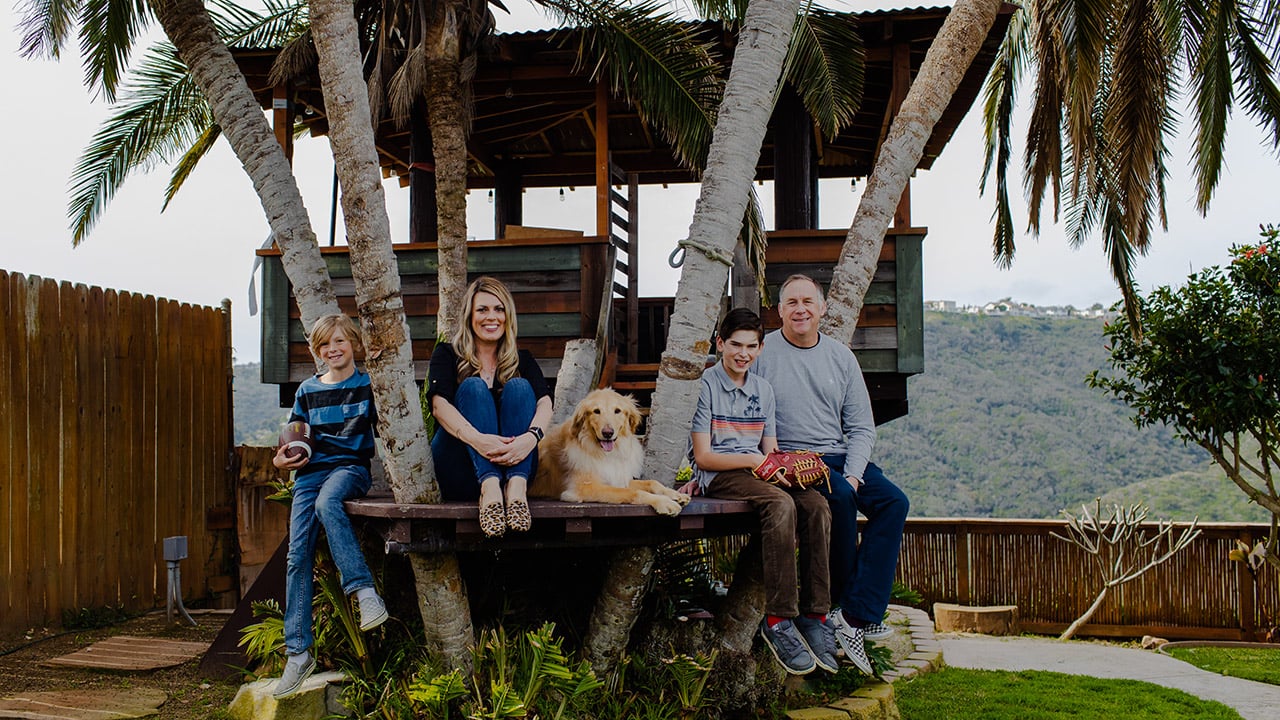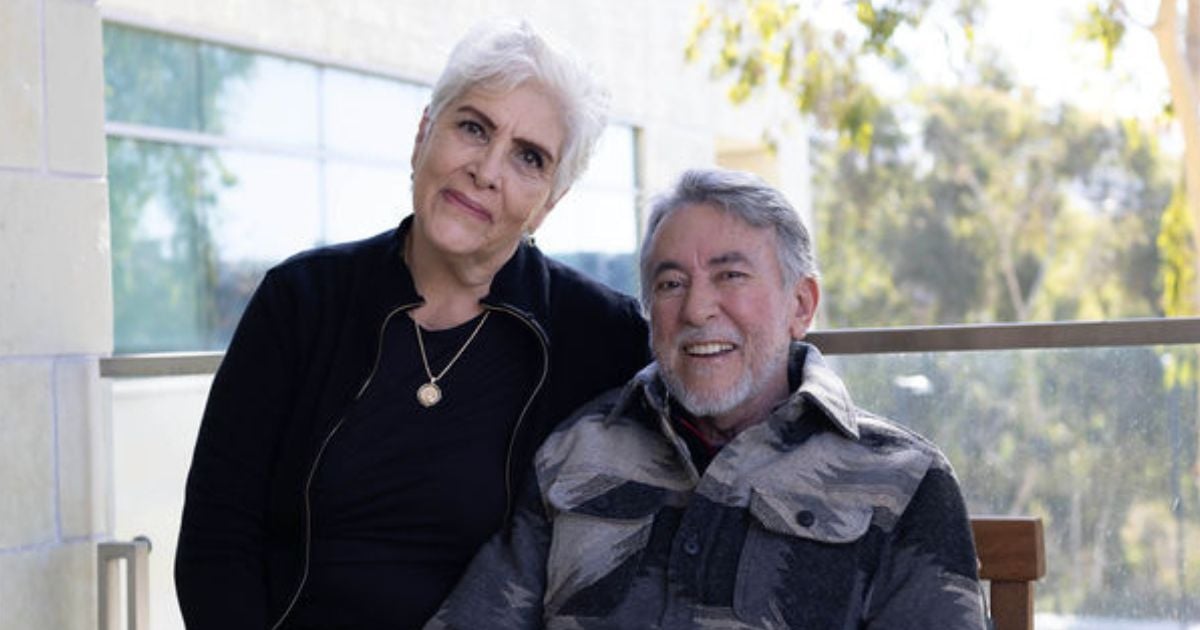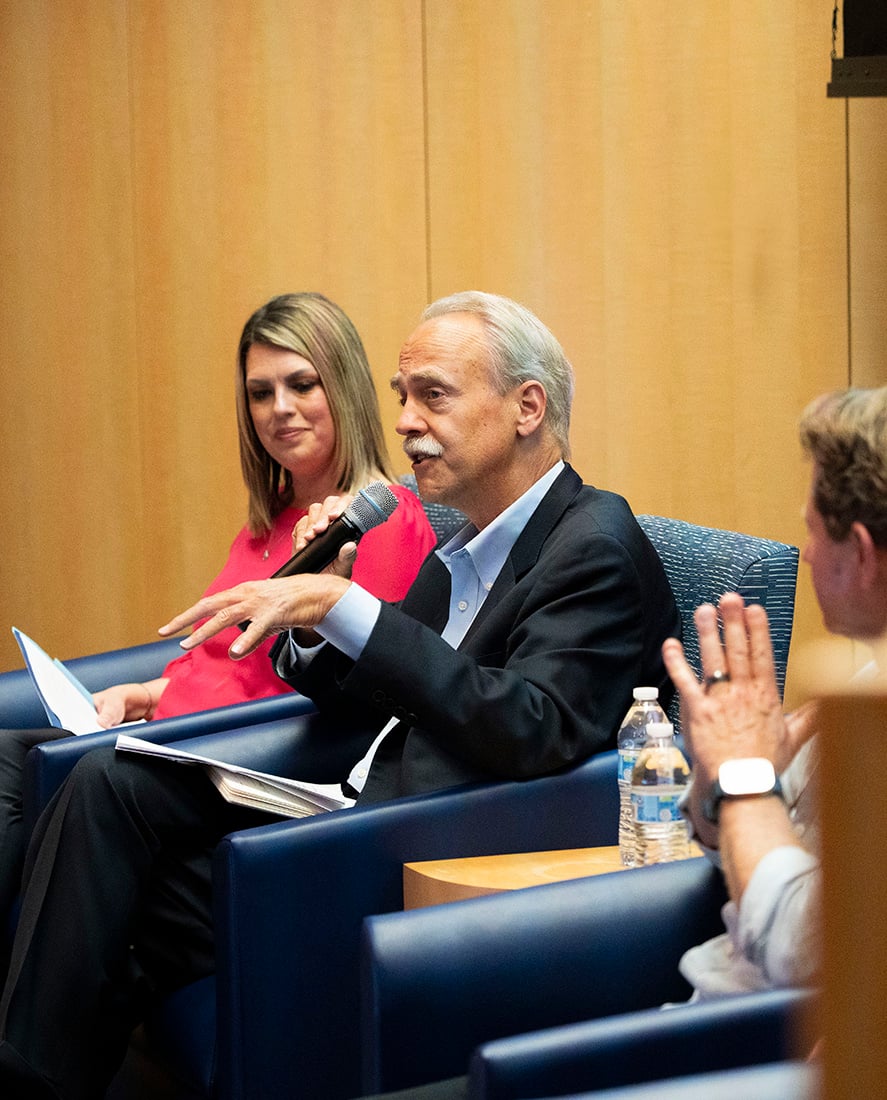 Paul Wormser (right) shares his story of being diagnosed with prostate cancer and the experience of receiving innovative treatment in a clinical trial during Clinical Trials Patient Appreciation Day at Moores Cancer Center at UC San Diego Health. Photo credit: Leslie Aquinde, UC San Diego Health
Paul Wormser (right) shares his story of being diagnosed with prostate cancer and the experience of receiving innovative treatment in a clinical trial during Clinical Trials Patient Appreciation Day at Moores Cancer Center at UC San Diego Health. Photo credit: Leslie Aquinde, UC San Diego Health
While sitting in the Moores Cancer Center auditorium at UC San Diego Health for the 2025 Clinical Trials Patient Appreciation Day, I was surrounded by medical teams, colleagues, community members and patients. I immediately connected with a patient, Paul Wormser, who was sitting next to me. There is an unspoken bond when you meet others who have gone through a cancer diagnosis. You are part of a club you never wanted to join — yet find deep meaning in the membership.
Wormser and I were part of an eight-patient panel chosen to share our experiences about participating in clinical trials. As we talked about our journeys before the event started, we both teared up. My mascara started to smear before I even made my way up to the stage.
Wormser was treated for prostate cancer and I was treated for breast cancer. Our stories were different chapters of a similar book.
Chapter one for me started approximately eight years ago when I felt an enlarged lymph node in my armpit area. My intuition was screaming at me, and I listened. Never ignore that feeling. You hear that in the back row scrolling your phone? I made a doctor’s appointment the next day.
I was diagnosed with an aggressive breast cancer that had already spread to my lymph nodes. I was age 39. My sons were 5 and 2. Suddenly, my life went from the chaos of trying to survive being a busy working mom to the chaos of trying to survive breast cancer.
There were sleepless nights, buckets of tears, and an aching pit in my stomach. Getting a cancer diagnosis is terrifying. It is an emotional roller coaster only those who have been through it truly understand. Wormser and the other patients on the panel understood.
Cancer does not discriminate. It doesn’t care about your age, job, life circumstances, gender, or future plans. The eight of us came from different backgrounds, but cancer brought us together on that stage to share our stories with an audience of approximately 250.
Being a mom and a breast cancer survivor are two of my identities. I am also the director of media relations for UC San Diego Health. I promote the services, care and treatment provided by our incredible health system. I have enough knowledge about nearly all conditions and diseases to be extremely vigilant about my own health, and at times, it makes me a bit of a hypochondriac — it’s a fine line.
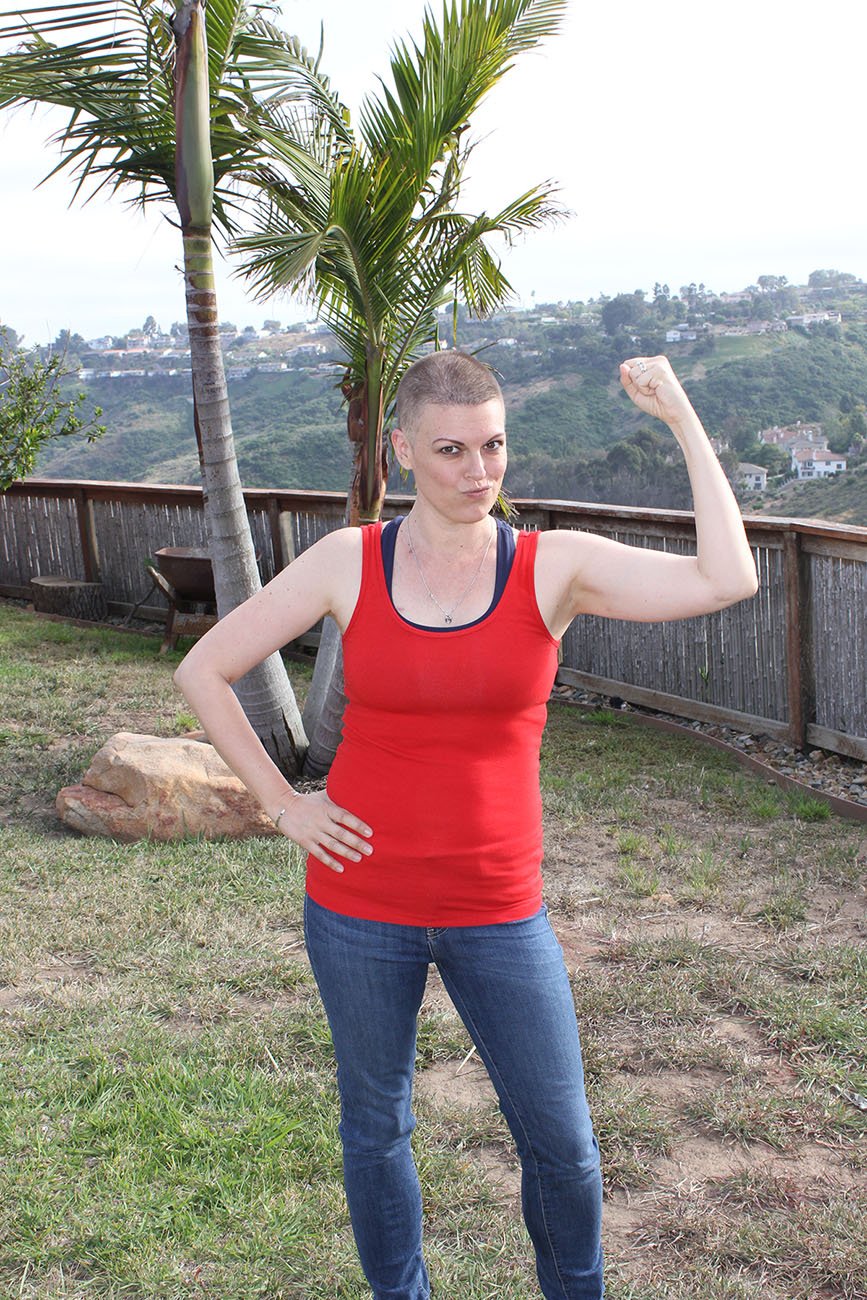 Michelle Brubaker was diagnosed with an aggressive type of breast cancer in 2017. She underwent chemotherapy, a double mastectomy, radiation, reconstruction and a hysterectomy. Photo courtesy of Michelle Brubaker
Michelle Brubaker was diagnosed with an aggressive type of breast cancer in 2017. She underwent chemotherapy, a double mastectomy, radiation, reconstruction and a hysterectomy. Photo courtesy of Michelle Brubaker
As part of my role, I have the honor of highlighting inspiring patient stories. I have observed surgeries, seen babies born weighing less than a pound, celebrated milestones in hospital rooms and held the hands of individuals who have faced their darkest days, as well as overcome remarkable odds.
But in February 2017, the roles reversed, and I became a patient who needed her hand held. I walked through the doors of our hospital looking through a new lens. I was given information about a clinical trial during the first appointment with my medical oncologist. My breast cancer type and stage qualified me. It didn’t take long for my husband and I to decide I was going to enroll. I was a mom on a mission. I was going to see my kids grow up. I needed to be armed with all the necessary equipment if I was going to kick cancer’s butt, which I planned to do.
As a National Cancer Institute-designated comprehensive cancer center, Moores Cancer Center at UC San Diego Health is among the top 4% of approximately 1,500 cancer centers in the nation. Patients have access to physicians who provide personalized care and are setting treatment standards nationwide for more than 200 types of cancer. UC San Diego Health is repeatedly ranked among the top 50 in the nation for cancer care by U.S. News & World Report.
"We are expanding our clinical trial operations to provide faster and better access at multiple sites across our community. We are bringing together physicians and researchers from across our system and nation to work collaboratively to reach better outcomes in a unique and rich scientific environment," said Diane Simeone, MD, director of Moores Cancer Center at UC San Diego Health and host of the Clinical Trials Patient Appreciation Day.
"Innovation is central to all we do. What sets us apart in the region is that we are involved in the design and execution of leading-edge clinical trials that bring promising new treatments directly to our patients."
Moores Cancer Center at UC San Diego Health is projected to enroll nearly 700 patients on to clinical trials in 2025, a 59% increase over the number enrolled in 2024 and a 141% increase over the 290 patient participants in 2023.
I enrolled in two clinical trials during my treatment. The first trial was during the chemotherapy portion. I took four pills daily along with a chemotherapy regimen to investigate how my type of breast cancer reacted to this novel treatment combination. During the second trial, I received proton therapy instead of standard radiation to study if the proton therapy for breast cancer can reduce damage to neighboring healthy tissue, like the heart and lungs.
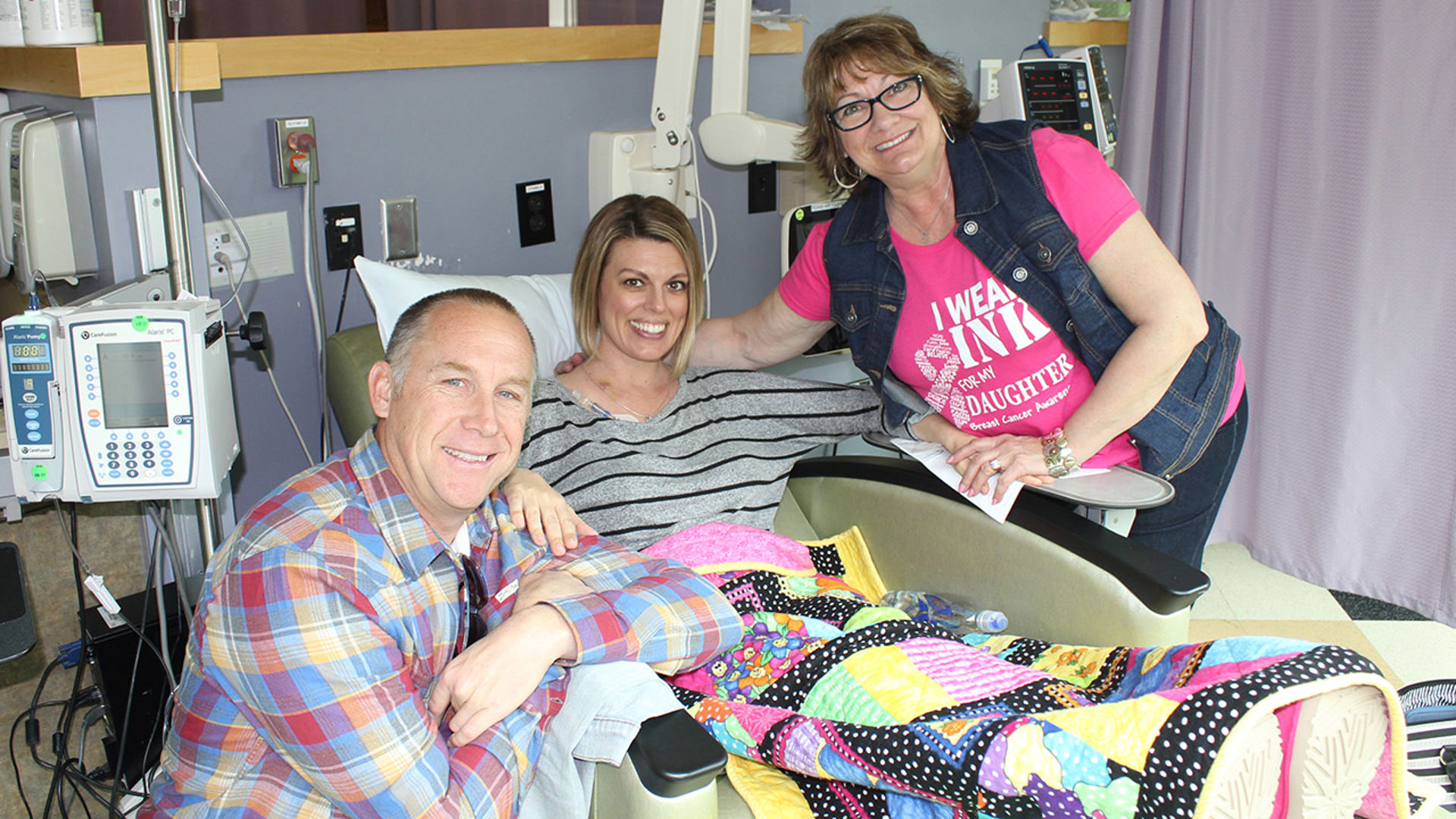
Michelle’s first day of chemotherapy with her husband and mom by her side. Michelle was enrolled in two clinical trials during her treatment. Photo courtesy of Michelle Brubaker
All clinical trials are designed differently. There is not a guarantee you will be assigned to the treatment arm or that the investigational drugs and approaches being tested receive U.S. Food & Drug Administration (FDA) approval. What is a guarantee is that all patients who enroll in a clinical trial are making a profound contribution to science for future generations. I take great pride in knowing that.
"Clinical trials are the heart of all medical advances. Enrolling in a trial is critically important in helping doctors and scientists identify more effective treatments, including both new drugs, as well as surgical techniques or medical devices," said Ramez Eskander, MD, professor in the Department of Obstetrics, Gynecology, and Reproductive Sciences at UC San Diego School of Medicine and director of the clinical trials office at Moores Cancer Center at UC San Diego Health.
"Without clinical trials, and the willingness of patients to explore treatment on clinical studies, we would not be able to identify new cancer therapies. All patients have a personal reason why they choose to enroll, and we are endlessly grateful for each one of them."
As the region’s only academic medical center, UC San Diego Health is integrated with University of California San Diego School of Medicine. Many doctors in the health system are part of the school of medicine, conducting peer-reviewed research and clinical trials that patients have access to. My medical oncologist and radiation oncologist were both the lead research investigators for the arms of the clinical trials I was enrolled in.
"Cancer touches all of us — whether directly or through someone we love. At UC San Diego Health, we want every patient who walks through our doors to feel confident they’re receiving the most advanced care available," said Patty Maysent, CEO, UC San Diego Health. "Through groundbreaking clinical trials, we are not only delivering today’s best treatments — we’re testing tomorrow’s therapies, today. And we do it with an unwavering commitment to compassionate, multidisciplinary care for both patients and their families."
All patients enrolled in a clinical trial are assigned clinical trials coordinators, or "health concierges," as I like to call them. Each coordinator I worked with answered my questions, eased my nerves and helped facilitate all of my appointments related to the clinical trial. Clinical trial coordinators are a significant part of clinical teams and became an extension of my family.
A few weeks after taking the investigational drug during chemotherapy, my tumor shrunk two-thirds, and my lymph node was back to normal size. I had hope. I transformed from a worrier to a warrior. Take that cancer. You big jerk.

Paul Wormser expresses deep gratitude to his entire medical team and family. He is now considered in remission after receiving investigational treatment while enrolled in a clinical trial. His wife and daughter supported him during the event and he was reunited with Rana McKay, MD, who led the trial. Photo credit: Kyle Dykes, UC San Diego
Wormser was introduced to a clinical trial in 2021. A routine blood test identified high A1C and prostate-specific antigen, known as PSA, a protein produced by the prostate gland that can be tested in blood. Further tests, scans and a biopsy, identified he had prostate cancer.
"When I first received that news, I felt immediate dread and fear," said Wormser. "I gained confidence and determination after deciding on my treatment plan."
He enrolled in a clinical trial led by Rana McKay, MD, associate director of clinical sciences and associate professor in the Department of Medicine at UC San Diego School of Medicine.
"There are many exciting diagnostic tests, biomarker assays and therapeutic treatments being developed in the world of cancer," said Rana McKay, MD, genitourinary medical oncologist at UC San Diego Health. "There is no one-size-fits-all approach to cancer. No two cancers are alike, just as no two people are alike. This complexity is what drives our teams to continually understand disease states and treatment options. At UC San Diego Health, we're leading innovative clinical trials that bring the latest breakthrough therapies to our patients."
“I want to recognize everyone who secures funding for trials, conducts trials and improves lives so I can continue to be with my beautiful wife of 42 years and our daughters. I am now a grandpa and embrace every second in that role.”
— Paul Wormser
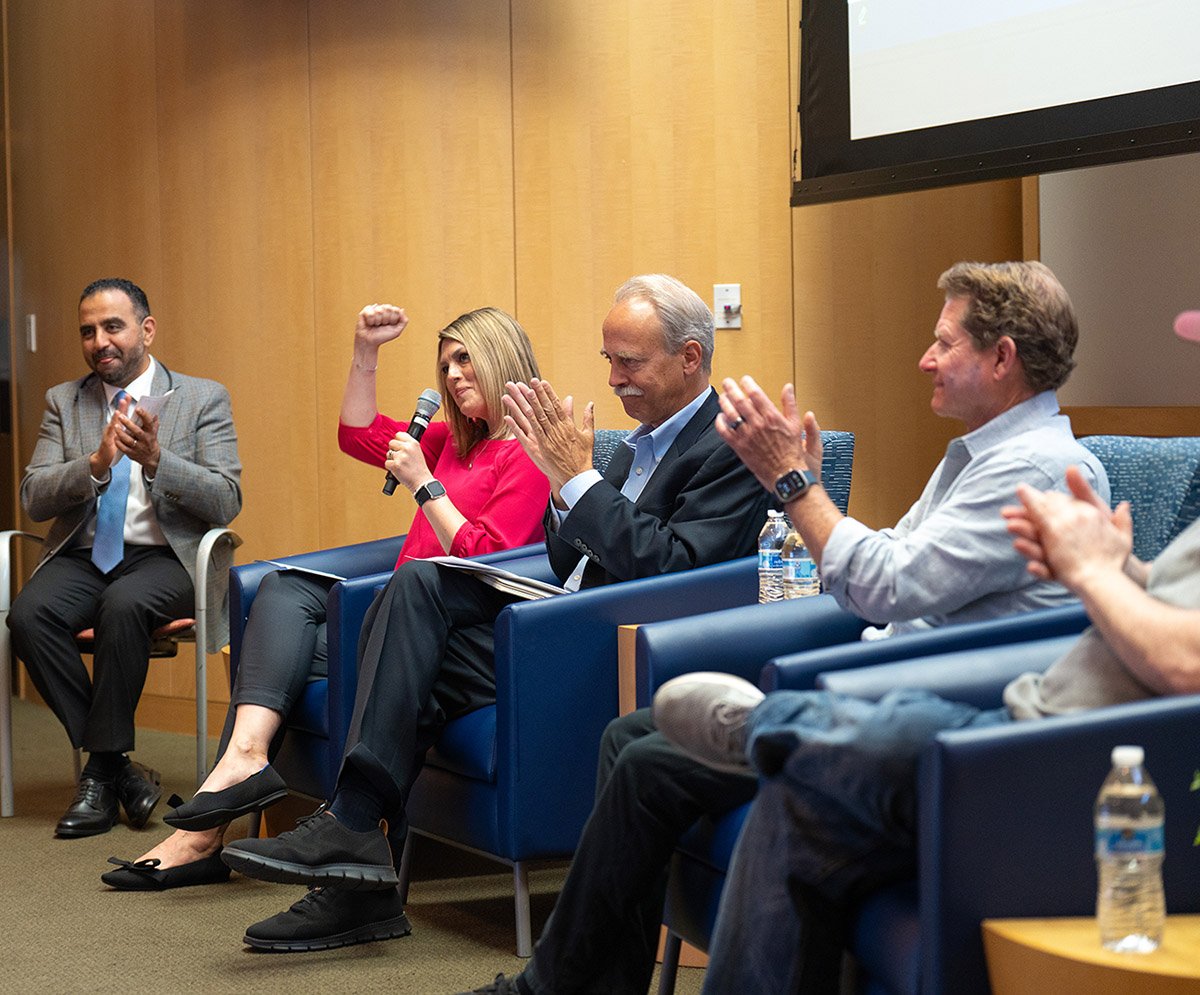 Michelle was one of eight patients who shared their stories and experiences to educate and bring hope, encouragement and inspiration to the audience of approximately 250. Kyle Dykes, UC San Diego
Michelle was one of eight patients who shared their stories and experiences to educate and bring hope, encouragement and inspiration to the audience of approximately 250. Kyle Dykes, UC San Diego
Wormser took daily pills and quarterly shots of an investigational drug during his trial. He shared during the patient panel that he had some side effects, like hot flashes, and he and I realized through laughter that we had something else in common at this stage of life.
"I left each appointment with gratitude for the entire medical team and all of the staff, gratitude for being in the trial and gratitude for my family," Wormser said.
Wormser received additional scans that he would not have had access to if not for the trial he was enrolled in. Two weeks before his surgery, a magnetic resonance imaging (MRI) showed his prostate was 40% smaller than when he was diagnosed. After a year of treatment, including a radical prostatectomy, Wormser’s PSA number is now undetectable, indicative of his cancer being in remission.
"I want to recognize everyone who secures funding for trials, conducts trials and improves lives so I can continue to be with my beautiful wife of 42 years and our daughters. I am now a grandpa and embrace every second in that role," said Wormser.
This sentiment was shared by all patients on the panel for Clinical Trials Patient Appreciation Day. Emotions rolled over the auditorium like a tsunami as the audience heard personal stories from patients who were treated for a variety of cancers, like brain, skin, tongue and ovarian.
It was an opportunity to educate and provide encouragement. I was profoundly touched by my fellow panelists and seeing hospital leadership and medical teams wipe tears from their cheeks.
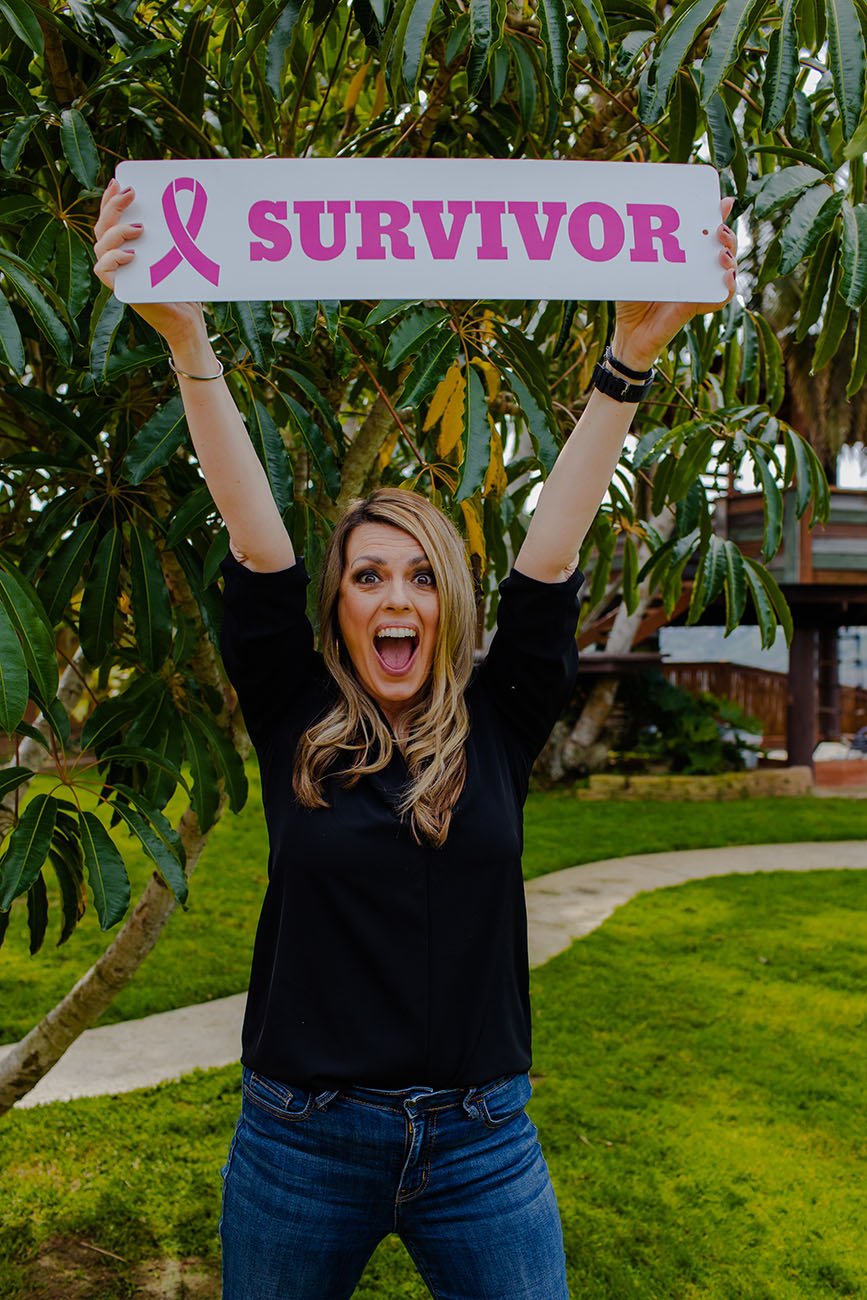 September will be eight years Michelle is considered breast-cancer free. She continues to publicly share her story to different audiences to raise awareness. Photo credit: Katherine Beth Photography
September will be eight years Michelle is considered breast-cancer free. She continues to publicly share her story to different audiences to raise awareness. Photo credit: Katherine Beth Photography
Eskander and McKay moderated the event, and both had patients on the panel.
"It is so impactful and inspiring for all of our teams to hear from the patients we care for," said Eskander, gynecologic oncologist at UC San Diego Health. "This event allowed us to recognize the significance of clinical trials and honor all patients who receive a cancer diagnosis — those we are now in remission, those who are still receiving treatment and those who have passed."
McKay and Wormser tightly embraced each other when the event was over. It was a beautiful example of the special relationship between the patient and their doctor.
"The patients’ willingness to share their experiences and advocate for clinical trials contributed to this meaningful event. Their courage and commitment are helping others better understand clinical trials and the importance of participation," McKay said.
One of the most touching moments for me happened the day after the event.
A patient with stage 4 colon cancer who had been in the audience sent me an email. He said the event changed his views on clinical trials, and he now sees that they are an important option to consider. He went on to share that one of the biggest gifts he has received through his cancer experience is growing closer to his brother.
"We never told each other ‘I love you’, and now it’s a regular occurrence," he wrote.

The Brubaker family went through a cancer diagnosis and journey together. They incorporate all the lessons learned to live a full, vibrant life together. Photo credit: Katherine Beth Photography
This September will mark eight years that I am considered breast cancer-free. I don’t take any day for granted. I think about cancer every day. However, my thoughts have transitioned from fear to motivation. They remind me to live my life fully and embrace the gifts I have received.
My sons are now 13 and 10. We have a motto in our family that Plan B is always better than Plan A. Cancer is most definitely a Plan B, but I would not change what I have been through because of the lessons learned and the beautiful life we have together, made possible, in part, by clinical trials.
Access to Innovative Treatments
UC San Diego Health physicians, who are also leading researchers, drive discoveries through clinical trials to identify promising new treatments.
